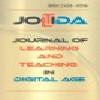Impact of Vocabulary Teaching Approach in Turkish Curriculum on Turkish Textbooks and Use of Technology in Vocabulary Teaching
Impact of Vocabulary Teaching Approach in Turkish Curriculum on Turkish Textbooks and Use of Technology in Vocabulary Teaching
___
- Belet Boyacı, Ş. D., Güner, M., & Babadağ, G. (2017). “Dünyada Başka Şekilde Yaşamak da Mümkün mü?” değer eğitiminde “Küçük Kara Balık” örneği. Eğitimde Nitel Araştırmalar Dergisi, 5(3), 172-19.
- Budak, Y. (2000). Sözcük öğretimi ve sözlüğün işlevi. Dil Dergisi, 92, 19-21.
- Ceran, D. (2015). Türkçe öğretmeni adaylarının türkçe ders kitaplarına ilişkin metaforları. Uşak Üniversitesi Sosyal Bilimler Dergisi, 8(3), 121-140.
- Ceylan, S., Duru, K., Erkek, G., & Pastutmaz, M. (2021). Ortaokul ve Imam Hatip Ortaokulu 6. Sınıf Türkçe Ders Kitabı. Ankara: Millî Eğitim Bakanlığı.
- Çapraz-Baran Ş., & Diren, E. (2019). Ortaokul ve Imam Hatip Ortaokulu Türkçe 5. Sınıf Ders Kitabı. Ankara: Anıttepe Yayıncılık.
- Çelik, T. (2021). Web 2.0 Araçları Kullanımı Yetkinliği Ölçeği Geliştirme Çalışması. Pamukkale Üniversitesi Eğitim Fakültesi Dergisi, 51, 449-478. DOI: 10.9779/pauefd.700181.
- Erkal, H., & Erkal, M. (2019). Ortaokul ve Imam Hatip Ortaokulu Türkçe 7. Sınıf Ders Kitabı. Ankara: Özgün Yayıncılık.
- Eselioğlu, H., Set, S. & Yücel, A. (2019). Ortaokul ve imam hatip ortaokulu Türkçe ders kitabı 8. Ankara: Millî Eğitim Bakanlığı.
- Hiebert, E. H. (2005). In pursuit of an effective, efficient vocabulary curriculum for elementary students. Teaching and learning vocabulary: Bringing research to practice, 1, 243-264.
- Hung, H., & Yuen, S. (2010). Educational use of social networking technology in higher education. Teaching in Higher Education, 15(6), 703-714.
- Karadağ, Ö. (2019). Kelime öğretimi. Pegem Akademi Yayıncılık.
- Karadağ, Ö., & Maden, S. (2014). Yazma eğitimi: kuram, uygulama, ölçme ve değerlendirme. A. Güzel ve H. Karatay (Ed.), Türkçe öğretimi el kitabı içinde (s. 265-301). Ankara: Pegem Akademi.
- Lüle Mert, E. (2013). İlköğretim Türkçe programı ile Türkçe çalışma kitaplarındaki kazanım ve etkinliklerin sözcük öğretimi açısından değerlendirilmesi. Dil ve Edebiyat Eğitimi Dergisi, 2(5), 13-31.
- Melanlıoğlu, D. (2008). Türkçe Eğitiminde Kelime Hazinesinin Önemi, Yüzüncü Yıl Üniversitesi Eğitim Fakültesi Dergisi.
- Millî Eğitim Bakanlığı Talim ve Terbiye Kurulu Başkanlığı. (2019). Türkçe Dersi Öğretim Programı. Ankara.
- Nation, P. (1990). Teaching and learning vocabulary. In Handbook of Practical Second Language Teaching and Learning (pp. 397-408). Routledge.
- Onan, B. (2020). Dil eğitiminin temel kavramları. Ankara: Nobel Yayıncılık
- Ömeroğlu, A. F., & Hakkoymaz, S. (2022). Ortaokul Türkçe Ders Kitaplarındaki Etkinliklerin Söz Varlığı Öğretiminde Kullanılan Yöntem ve Teknikler Açısından Değerlendirilmesi. Ana Dili Eğitimi Dergisi, 10(2), 347-362.
- Pan, Q., & Xu, R. (2011). Vocabulary Teaching in English Language Teaching. Theory & Practice in Language Studies, 1(11), 1586-1589
- Sharma, S., & Unger, S. (2016). Employing Web 2.0 Technologies to Support Students' Academic Vocabulary Acquisition. Michigan Reading Journal, 48(3), 16-29
- Yayın Aralığı: 2
- Başlangıç: 2016
- Yayıncı: Mehmet Akif Ocak
Examination of Digital Game Addiction Levels of Adolescent Mainstreaming Students
Tuğba SİVRİKAYA, Müzeyyen ELDENİZ ÇETİN
Berna YÜNER, Barış ERİÇOK, Behiye ERTAŞ
Canan ÖZÇELİK AKAY, Ozlem CAKİR
Mehmet Fatih PEKYÜREK, Hatice YILDIZ DURAK, Mustafa SARITEPECİ, Yıldız ÖZAYDIN AYDOĞDU, Eda AKDOĞDU YILDIZ
Effects of Cognitive Load Level on Students’ Attitude towards the Gamified Course
Students’ Opinions on the Usage of Mobile Augmented Reality Application in Health Education
